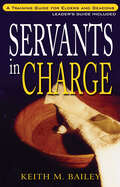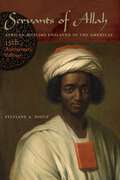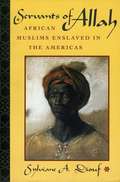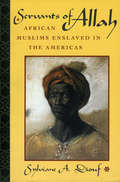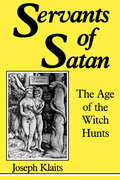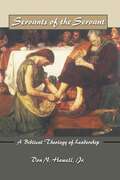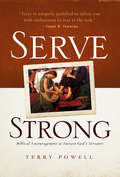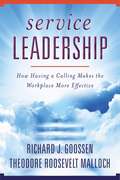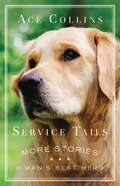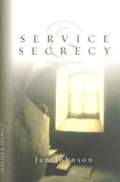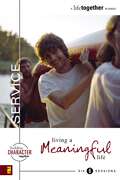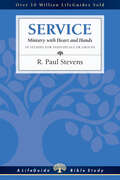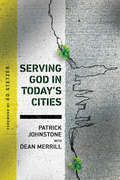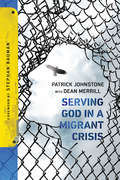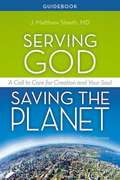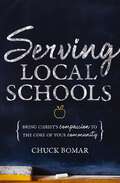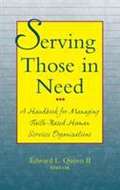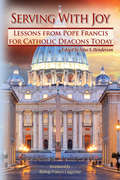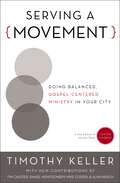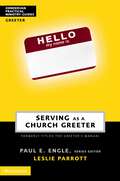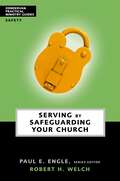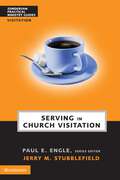- Table View
- List View
Servants in Charge: A Training Guide for Elders and Deacons
by Keith M. BaileyServants in Charge is a training guide for elders and deacons with a study guide included. Servants in Charge define the roles of elders and deacons and offers practical suggestions for selecting these important leaders. And for servants who find themselves in charge, there are guidelines toward effective and fruitful ministry. Have you ever been in an office or a place of business when someone walked in and asked, "Who's in charge here?"' Can it be that the people who enter your church ask the same question but it is important to realize the answer is not a mystery. In a beautiful parable about His second coming, Jesus made it clear that His servants are in charge. These people are known not so much for their position or power, but for their attitude of true servant hood. In Servants in Charge we find that Dr. Bailey deals with the topics of who a deacon and elder are to be to what their qualifications are from a scriptural basis. He also goes on to explain their biblically based ministries and their spiritual gifts as laid out in the New Testament. He completes this short study with a guide for preparation for them and their election and consecration. A great must have for the church today.
Servants of Allah: African Muslims Enslaved in the Americas
by Sylviane A DioufAn illuminating study of how African Muslims drew on Islam while enslaved, and how their faith ultimately played a role in the African Disapora. It is widely assumed that the faith enslaved West African Muslims brought to the Americas was quickly absorbed into their new Christian milieu. Yet, as Sylviane A. Diouf demonstrates in this meticulously-researched, groundbreaking volume, Islam flourished during slavery on a large scale. Even while enslaved, many Muslims managed to follow most of the precepts of their religion. Often literate, urban, and well-traveled, they drew on their organization, solidarity and the strength of their beliefs to play a major part in the most well-known slave uprisings. But for all their accomplishments and contributions to the history and cultures of the African Diaspora, the Muslims have been largely ignored. Servants of Allah illuminates the role of Islam in the lives of both individual practitioners and communities, and shows that though the religion did not survive in the Americas in its orthodox form, its mark can be found in certain religions, traditions, and artistic creations of people of African descent. This fifteenth-anniversary edition has been updated to include new materials and analysis, a review of developments in the field, prospects for new research, and illustrations.
Servants of Allah: African Muslims Enslaved in the Americas
by Sylviane A. DioufExplores the stories of African Muslim slaves in the New World. The author argues that although Islam as brought by the Africans did not outlive the last slaves, "what they wrote on the sands of the plantations is a successful story of strength, resilience, courage, pride, and dignity. " She discusses Christian Europeans, African Muslims, the Atlantic slave trade, literacy, revolts, and the Muslim legacy. Annotation copyrighted by Book News, Inc. , Portland, OR
Servants of Allah: African Muslims Enslaved in the Americas
by Sylviane A. DioufDespite the explosion in work on African American and religious history, little is known about Black Muslims who came to America as slaves. Most assume that what Muslim faith any Africans did bring with them was quickly absorbed into the new Christian milieu. But, surprisingly, as Sylviane Diouf shows in this new, meticulously researched volume, Islam flourished during slavery on a large scale. Servants of Allah presents a history of African Muslim slaves, following them from Africa to the Americas. It details how, even while enslaved many Black Muslims managed to follow most of the precepts of their religion. Literate, urban, and well traveled, Black Muslims drew on their organization and the strength of their beliefs to play a major part in the most well known slave uprisings. Though Islam did not survive in the Americas in its orthodox form, its mark can be found in certain religions, traditions, and artistic creations of people of African descent. But for all their accomplishments and contributions to the cultures of the African Diaspora, the Muslim slaves have been largely ignored. Servants of Allah is the first book to examine the role of Islam in the lives of both individual practitioners and in the American slave community as a whole, while also shedding light on the legacy of Islam in today's American and Caribbean cultures. Choice Outstanding Academic Title of 1999.
Servants of Satan: The Age of the Witch Hunts
by Joseph KlaitsHow the persecution of witches reflected the darker side of the central social, political, and cultural developments of the sixteenth and seventeenth centuries.This is the first book to consider the general course and significance of the European witch craze of the sixteenth and seventeenth centuries since H.R. Trevor-Roper’s classic and pioneering study appeared some fifteen years ago. Drawing upon the advances in historical and social-science scholarship of the past decade and a half, Joseph Klaits integrates the recent appreciations of witchcraft in regional studies, the history of popular culture, anthropology, sociology, and psychology to better illuminate the place of witch hunting in the context of social, political, economic and religious change.“In all, Klaits has done a good job. Avoiding the scandalous and sensational, he has maintained throughout, with sensitivity and economy, an awareness of the uniqueness of the theories and persecutions that have fascinated scholars now for two decades and are unlikely to lose their appeal in the foreseeable future.” —American Historical Review“This is a commendable synthesis whose time has come . . . fascinating.” —The Sixteenth Century Journal“Comprehensive and clearly written . . . An excellent book.” —Choice“Impeccable research and interpretation stand behind this scholarly but not stultifying account.” —Booklist“A good, solid, general treatment.” —Erik Midelfort, C. Julian Bishko Professor Emeritus of History and Religious Studies, University of Virginia“A well written, easy to read book, and the bibliography is a good source of secondary materials for further reading.” —Journal of American Folklore
Servants of the Servant: A Biblical Theology of Leadership
by Don N. Howell Jr.Leadership is a subject that has gained impressive visibility in the past two decades. The number of books, monographs and articles, as well as seminars, devoted to the development of one's leadership skills has been almost exponential growth. This study is an attempt to forge a full-orbed theology of Christian leadership grounded in the teaching of Scripture. What emerges from tracing the theme of leadership through the biblical record is a servanthood pattern, one that is wholly distinct from prevailing secular models. Our exposition begins with the biblical language of the servant, the term of choice for those great leaders used of God to further his saving purposes in the world. Eleven Old Testament and five New Testament leaders are profiled. The portrait of Jesus Christ focuses on three motifs that governed his training of the twelve for kingdom ministry. The Pauline letters are mined for those convictions that governed Paul's practice of leadership, both of his mission team and of the faith communities that emerged from that mission. The treatment of each leader, from Joseph to Paul, begins with a series of preliminary questions and concludes with a mini-profile that correlates the biblical data with these questions. The final chapter offers a summary profile of the servant leader, one whose character, motives and agenda align with the divine purposes. Though designed as a textbook for upper level college and seminary courses on leadership, the book's readable format is ideal for churches and parachurch organizations in their leadership training programs. The author's prayer is that this work will serve as a catalyst to call God's people back to Scripture and thereby raise up a whole new generation of authentic servant-leaders.
Serve Strong: Biblical Encouragement to Sustain God's Servants
by Terry PowellServe Strong helps volunteers as well as vocational Christian workers combat discouragement, persevere through weariness, and cultivate endurance for the long haul.Serve the Lord long enough and discouragement or some form of opposition is inevitable. Joy-sapping workloads, feelings of inadequacy, lack of fruitfulness, or battle fatigue from spiritual warfare often spurs God's servants to quit or sabotages their passion. The purpose of this book is to infuse them with biblical perspectives that buoy flagging spirits, boost motivation, and cultivate endurance.
Service Leadership: How Having a Calling Makes the Workplace More Effective
by Theodore Malloch Richard J. GoossenWhat will motivate an organization’s employees to be fully engaged in the corporate purpose? How can a company be more supportive of each individual’s pursuit of workplace meaning? Service Leadership answers these questions and more. “Service leadership” is the recognition and cultivation of the varied interests and beliefs of employees on their quest for purpose at work. An organization will not get the most out of its staff unless it respects each individual’s framework for the pursuit of meaning, which is often done in the context of spirituality and religion. Service leadership takes many forms and is not the same for everyone. People can and want to learn how to become service leaders. Service Leadership shows how these ideas can be implemented through a detailed framework. Extensive research confirms that organizations that do not address the existing core belief systems of employees will be disadvantaged in the marketplace. Interviews with top executives at organizations like Whole Foods, Facebook, Gloria Jean’s Coffee, and Costco shed light on how both companies and employees can utilize service leadership to find and keep meaning in the workplace, improving both job happiness and performance.
Service Tails: More Stories of Man's Best Hero
by Ace CollinsNot all heroic dogs wildly toss themselves into lifesaving situations. Some save lives simply by their incredible commitment to duty and service. Some lead the way to independence for people whose disabilities were supposed to limit their lives. In Service Tails: More Stories of Man’s Best Hero, prolific author Ace Collins introduces us to leaders whose entire lives are wrapped in the banner of service. Their stories are remarkable snapshots of the value of vision and teamwork, as well as devotion to duty and unconditional love and acceptance–stretching the way we see both canine and human potential. Their training was intense, their loyalty unquestioned and each step of the way they constantly adapt to better serve those they lead. These unforgettable dogs are more than heroes; they are models from which we can learn how to love and serve unconditionally.
Service: Living a Yielded Life (Building Character Together)
by Todd Wendorff Brett Eastman Dee Eastman Denise WendorffWhat does it take to build character? How do you instill godly qualities inside yourself that are displayed consistently through words, actions, and attitudes that reflect what Jesus himself is like? Building Character Together takes you and your small group inside the Bible to learn character-building lessons from some of its most compelling figures. In six enjoyable, interactive sessions, each volume in this six-volume series helps you deeply explore the complex issues of developing Christian character. Combining study, discussion, and shared experiences, here is a pathway to growth both individually and as a group. Explore the lives of David, Mary Magdalene, Jacob, and other men and women of the Bible. Learn lessons from their successes and failures and from their relationships with God and other people that you can readily link to yourself and your own life circumstances. Enjoy frank discussions that draw you and other group members deeper into each others’ lives. And put it all into action in a one-day group retreat, a service project, a mini-mission work, and other experiences that help you make the leap from good words to good works.
Service: Ministry with Heart and Hands (LifeGuide Bible Studies)
by R. Paul StevensIn this LifeGuide Bible Study includes ten sessions exploring service in a variety of contexts: family, the physical creation, society, the city, neighbors, relationships, the church and the workplace. Looking inside ministry specifically, R. Paul Stevens examines examples of service that were motivated by imagination, passion, faith, hope and love—from Genesis to Revelation. Out of these studies you will discover how to live and serve wholeheartedly. No matter what your profession, you are a full time minister of Jesus Christ. For over three decades LifeGuide Bible Studies have provided solid biblical content and raised thought-provoking questions—making for a one-of-a-kind Bible study experience for individuals and groups. This series has more than 130 titles on Old and New Testament books, character studies, and topical studies.
Serving God in Today's Cities: Facing the Challenges of Urbanization (Operation World Resources (ows) Ser.)
by Dean Merrill Ed Stetzer Patrick JohnstoneWelcome to the world's first urban century. How will you respond? For the first time ever, more people now live in cities than outside them. Cities offer both big headaches and vast opportunities, and agencies that once focused on rural work are increasingly turning their attention to urban centers. Join veteran researcher and missiologist Patrick Johnstone as he explores the fastest growing cities and megacities in the world, showing how Christian workers are addressing people's spiritual, physical, and social needs. In 1962 Patrick Johnstone left England's countryside to serve the bustling townships of apartheid-era South Africa. His pioneering of urban ministries changed his life. Journey with Patrick and Dean Merrill as they share God's heart for the city and introduce pastors, missionaries, and community workers who are addressing urbanization's key challenges. God has a heart for today's cities. See how you can join this urgent mission.
Serving God in a Migrant Crisis: Ministry to People on the Move (Operation World Resources)
by Dean Merrill Stephan Bauman Patrick Johnstone"God has used migration for millennia to achieve his purposes for his people," writes Patrick Johnstone. "He is doing so again in our time." Millions are on the move, driven by war, drought, terrorism, poverty, failed states, environmental catastrophes, disease, revolutions, and the desire for a better life. Christians have a unique perspective on the migrant crisis: after all, Jesus was a refugee. So were Abraham, Joseph, and Moses. Today, some turn their backs on refugees. In Serving God in a Migrant Crisis, Patrick Johnstone and Dean Merrill help us understand what's causing today's refugee crisis, explore Christian theology and tradition on migration, and show us how Christian workers around the globe are opening their hearts to embrace these modern outcasts. "The world has literally come to our doorstep," they write. "Will we open the door?"
Serving God, Saving the Planet Guidebook: A Call to Care for Creation and Your Soul
by J. Matthew SleethServing God, Saving the Planet is a study that will broaden the conversation with a focus on the dangers of materialism, workaholism, and spiritual bankruptcy—as well as God’s endless invitations for us to enjoy what he has created. This twelve-session study provides simple, everyday ways to focus on stewardship and sustainability according to Scripture. In the first six sessions, Dr. Matthew Sleeth explores his personal salvation experience and desire to follow Jesus in the context of the love story God tells in Genesis. Dr. Sleeth guides readers through each of the created elements, reminding them of the God-given commission to “tend and protect the planet.” In the final six sessions, Dr. Sleeth examines how God's original command to “tend and protect the planet” extends into the actions and activities of every Christian’s everyday lives. Designed for use with the video.
Serving Like Christ (Experiencing Christ Together)
by Karen Lee-Thorp Todd Wendorff Brett Eastman Dee Eastman Denise Wendorff"Each of your students is a unique creation. Some are funny, some serious, some industrious, others are more thoughtful. Together, they make up the body of Christ and are each called to serve in their own special way. Serving Like Christ Together helps students discover ways to serve God by serving others. Six sessions unpack and explain the aspects of a servant’s heart that Jesus values most: • Humility and Sacrifice: redefining what it means to be successful • Seeing Christ in Others: learning to serve God by serving his people • Compassion: seeing need and taking action • The Holy Spirit: relying on the Holy Spirit to direct and fuel service • Bondslaves: understanding what it means to be a slave to Christ • Serving Outsiders: discovering the joy of helping difficult people Service gives students a chance to discover their gifts, build friendships inside and outside the group, and refocus their priorities on something larger than themselves."
Serving Local Schools: Bring Christ's Compassion to the Core of Your Community
by Chuck BomarThe heartbeat of every local community is found in its local schools. Yet many Christians have little to no connection with school leaders, and few churches have an active ministry presence. If you want to effectively reach your community, you must take the time to invest in school administrators, teachers, and families. Not having a relationship just isn’t an option. Many schools today are facing budget crises’ and financial shortfalls or declining enrollment. School leaders and teachers are more open than ever before to partnering with parents, neighbors, and churches in a sustainable way. This book shares stories and examples of how schools and churches can work together for the common good of students and the community. You’ll gain a better understanding of the laws defining the line of separation between church and state, and you will learn how to best approach school leaders with creative ideas for working together. Serving Local Schools provides biblical support and practical resources to equip individuals and churches to meet the needs of local schools while faithfully witnessing to the good news found in Jesus Christ.
Serving Those in Need: A Handbook for Managing Faith-Based Human Services Organizations
by Edward L. Queen IIGiven the increased pressures and higher demand on social-service organizations, faith-based providers must find ways to increase their effectiveness while maintaining their religious distinctiveness.
Serving Up a Sweetheart: A February Wedding Story (A Year of Weddings Novella)
by Cheryl WyattThey’ve helped orchestrate the perfect day for countless couples. Now twelve new couples will find themselves in the wedding spotlight in the second Year of Weddings novella collection. Meadow knows how to serve delicious food to match any wedding theme. But can she accept love when it's served up on a silver platter? During one of the biggest weeks of her catering career, Meadow Larson’s kitchen roof caves in after an unrelenting blizzard. She has to accept help from the last person on earth she wants to see: Colin McGrath. The tormentor from her past is now a contractor, her new neighbor—and the only person available to take on a project of this size. Colin is aware God has given him a second chance to make things right with Meadow after bullying her in high school. After years of regret and guilt, Colin is determined to earn her respect and forgiveness, no matter what it takes. It’ll take an extreme kitchen renovation, several cooking lessons, a little lace, and a lot of grace, but God is using this renovation project not only to restore Meadow’s heart, but also to restore Colin’s integrity in her eyes. Will Meadow learn to trust the new Colin even as their relationship grows from a business exchange to something more meaningful?
Serving With Joy: Lessons From Pope Francis for Catholic Deacons Today (Deacon Books)
by William T. Ditewig Steve Swope Greg Kandra Father Frank DeSanioSince the early days of his pontificate, Pope Francis has challenged us to reclaim the &“good news&” of the Gospel and to allow that good news to heal shattered lives. He is an evangelist of hope who models true servant leadership and whose witness to joy has changed the Church and the world. This small volume brings together the reflections of five leaders in the deacon community in the United States on the joy-filled witness of Pope Francis and what his message means for deacons today.
Serving a Movement: Doing Balanced, Gospel-Centered Ministry in Your City (Center Church)
by Timothy KellerIn Serving a Movement, best-selling author and pastor Timothy Keller looks at the nature of the church&’s mission and its relationship to the work of individual Christians in the world. He examines what it means to be a &“missional&” church today and how churches can practically equip people for missional living. Churches need to intentionally cultivate an integrative ministry that connects people to God, to one another, to the needs of the city, and to the culture around us. Finally, he highlights the need for intentional movements of churches planting new churches that faithfully proclaim God&’s truth and serve their communities.This new edition contains the third section of Center Church in an easy-to-read format with new reflections and additional essays from Timothy Keller and several other contributors.
Serving as Senders Today: How to Care for Your Missionaries
by Neal PiroloServing As Senders: How to Care for Your Missionaries While They are Preparing to Go, While They are on the Field and When They Return Home. The title says it all! A missionary needs care in at least six areas: Moral Support, Logistics Support, Financial Support, Prayer Support, Communication Support, and Reentry Support. This book gives scores of practical ideas in how a team can provide the necessary care for a missionary. Chapter One tells "when" and "why" a missionary needs care. Chapters Two through Seven deal with each of the six areas of care. Chapter Eight brings it back to the individual's involvement in care giving. "I strongly believe that this is one of the most significant missionary books of this decade. Unless the Church and God's people respond to its message, the work of reaching the unreached is going to be greatly hindered. Every committed sender needs to get involved in distributing this book." -- George Verwer, Operation Mobilization "This key book makes the strategic point that mobilizers--the senders--are as crucial to the cause of missions as frontline missionaries. It is a book just crammed with solid, exciting insights on the most hurting link in today's mission movement." -- Dr. Ralph Winter, U.S. Center for World Mission.
Serving as a Church Greeter (Zondervan Practical Ministry Guides)
by Leslie Parrott Paul E. EngleFor: •Individual use •Group training Greeters are the welcoming arms that people long to find in a church. This practical guidebook will help you reach out to people who need to experience the warmth of belonging to a church family. Serving as a Church Greeter sheds light on •The Ministry of Church Greeters •The Need for Warmhearted Greeters •Developing a User-Friendly Foyer •A Better Way of Doing Things •The Parking Lot Ministry Zondervan Practical Ministry Guides provide you with simple, practical insights for serving in today’s churches. Written by experienced pastors and church workers, these easy-to-read, to-the-point booklets address the fundamentals of different ministries as practiced effectively in real life. You’ll find biblical insight and wise, field-tested advice you can apply today, as well as discussion questions to help you think through and integrate what you read.
Serving by Safeguarding Your Church (Zondervan Practical Ministry Guides #No. 4)
by Robert H. WelchFor: ·Individual use ·Group training Includes diagrams, checklists, and resource lists Church ought to be the safest place on earth. Here’s how to fulfill that goal in practical ways, from developing a security structure and team, to assessing interior and exterior building security, training ushers and greeters to be sensitive to security, forming an emergency reaction team, establishing financial accountability, and much more. Serving by Safeguarding Your Church takes you through the ins and outs of ·Building for Security ·Organizing for Security ·Taking Actions to Improve Security ·Dealing with Keys, Alarms, and Security Systems Zondervan Practical Ministry Guides provide you with simple, practical insights for serving in today’s churches. Written by experienced pastors and church workers, these easy-to-read, to-the-point booklets address the fundamentals of different ministries as practiced effectively in real life. You’ll find biblical insight and wise, field-tested advice you can apply today, as well as discussion questions to help you think through and integrate what you read.
Serving in Church Visitation (Zondervan Practical Ministry Guides)
by Paul E. Engle Jerry M. StubblefieldFor: •Individual use •Group training Includes self-assessment and do’s and don’ts for various special-needs situations. Whether visiting people in their homes, in the hospital, or in a restaurant over a cup of coffee, the simple act of connecting with others is filled with powerful possibilities. The act of friendship is an inroad to hearts and lives that creates trust, value, and incredible potential for ministry. Serving in Church Visitation helps you to •Be Motivated: How Does the Bible Model the Importance of Visitation? •Be Prepared: What Kind of Person Makes a Good Visitor? •Be Informed: What Kind of Visits Are Possible? •Be Involved: What Kind of Inreach Visits Can Be Made? •Be Equipped: How Should Scripture and Prayer Be Used? Zondervan Practical Ministry Guides provide you with simple, practical insights for serving in today’s churches. Written by experienced pastors and church workers, these easy-to-read, to-the-point booklets address the fundamentals of different ministries as practiced effectively in real life. You’ll find biblical insight and wise, field-tested advice you can apply today, as well as discussion questions to help you think through and integrate what you read.
